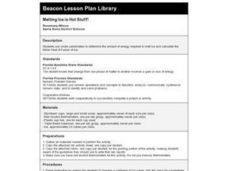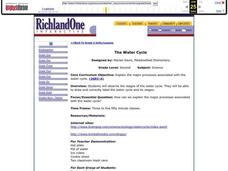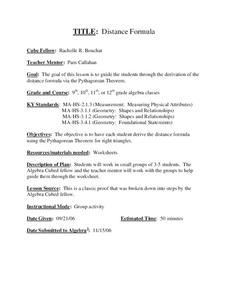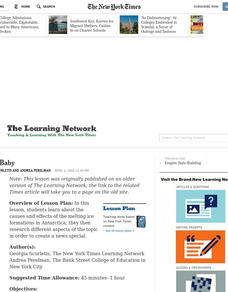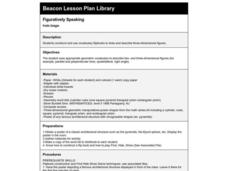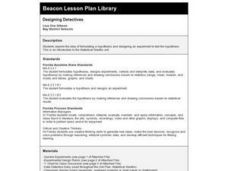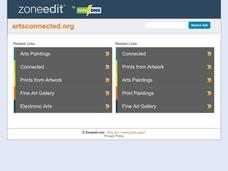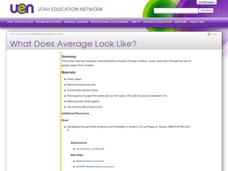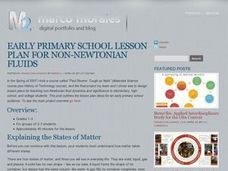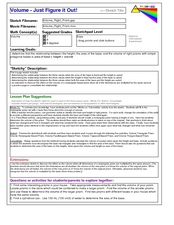Curated OER
Observing Reactions
Young scholars use the scientific method to complete to experiments that have visible reactions. In this visible reaction lesson, students participate in an experiment with melting ice and one with inflating a balloon. Young scholars...
Curated OER
Melting Ice is Hot Stuff!
Fourth graders determine the amount of energy required to melt ice using a calorimeter. They calculate the Molar Heat of Fusion of Ice.
Curated OER
The Water Cycle
Second graders conduct an a water cycle experiment. For this water cycle lesson, 2nd graders observe a puddle of water, they predict how it got there and what will happen to it. Students watch a demonstration on the water cycle and...
Curated OER
Flower Pot Salad Bar
Learners discuss the connection between a flower pot and wholesome food by creating a salad. In this healthy eating lesson, students utilize numerous fresh vegetables to create a classic salad in a flower pot. Learners write...
Curated OER
Distance Formula
Young scholars calculate the distance between two points using the distance formula. In this geometry lesson, students derive the distance formula using the Pythagorean Theorem.
Curated OER
The Spider's Life Cycle
Students see that spiders have a life cycle, and reproduce by laying many eggs. We can count by ones, twos, fives, or as many as we want. They make two lists of animals on a chart.
Curated OER
The Built Environment-An Integrating Theme
Learners observe, record, and present knowledge of their local built environment while conducting a walking tour of their community. They develop written and photo journals, drawings, time lines, graphs, and charts to engage in...
Curated OER
A Plop and Fizz
Seventh graders perform an experiment to determine the effect of temperature on reaction rates. In this chemistry lesson, 7th graders take measurements and record data. They create a graph and analyze results.
Curated OER
Ice, Ice, Baby
Students explore the causes and effects of the melting ice formations in Antarctica; they then research different aspects of the topic in order to create a news special.
Curated OER
Figuratively Speaking
Third graders construct and use vocabulary flipbooks to draw and describe three-dimensional figures. They utilize worksheets and access websites imbedded in this plan which help them construct their books.
Curated OER
Designing Detectives
Third graders explore the idea of formulating a hypothesis and designing an experiment to test the hypothesis.
Curated OER
Talking Rocks
Third graders explain the difference between Petroglyphs and Pictographs from Ancient Native American peoples. They create symbols that are representative of a story about their world.
Curated OER
Talking Rocks
Third graders consider the differences between pictographs and petroglyphs. They create symbols from a story about their worlds. They make pottery art.
Curated OER
What Makes a Habitable Planet?
Students list conditions necessary for humans to survive. They then mix yeast with a nutrient broth consisting of warm water and table sugar in a plastic bottle, capping it with a party balloon and compare the factors within the bottle...
Curated OER
What Does Average Look Like?
Fifth graders explore the concepts of range, median, mode, and mean through the use of graphs drawn from models. They use manipulatives to represent data they have collected within their groups, and compare the differences between mode,...
Curated OER
Pyramids and Prisms: Guler's Formula
Sixth graders detect and categorize the attributes of geometric shapes to solve problems. In this geometry lesson, 6th graders construct a variety of polyhedra. Students recognize the relationships between two dimensional and three...
Curated OER
Create Your Own Fog
Students conduct an experiment. In this science lesson, students create their own fog. Students observe the results.
Curated OER
Non-Newtonian Fluids
Students will use water, cornstarch, eggs, and more to explore the different states of matter. They will make observations of an unknown substance called "Oobleck" and test its liquid and solid properties. This would be a great lesson to...
Curated OER
Building Buildings
Seventh graders investigate 2-D and 3-D objects. In this geometry lesson, 7th graders begin to understand spatial reasoning. Students look at pictures of the NYC Skyline and discuss what it looks like from different views. Students use...
Curated OER
Water Magic
Learners conduct experiments with ice, water and steam to observe the water cycle. They discuss substances that water accumulates from the Earth as it moves through its cycle.
Curated OER
More Rocket Science
Students observe two rocket science experiments, and create a graph to demonstrate the results. They draw a picture and write an explanation of the results of the experiments.
Curated OER
Area & Perimeter
Students define area and perimeter. They demonstrate understanding of the concepts concretely, with manipulatives, and describe with words, their strategies and thought processes.
Curated OER
Diffusion of Molecules
Young scholars conduct a series of experiments to observe factors that impact molecular movement. In this molecular chemistry lesson, students drop food coloring in water with different properties (hot, with ice, with alcohol) and...
Curated OER
Volume of Prisms
Students calculate the volume of different polygons. In this geometry lesson plan, students identify the relationship between base and height. They calculate the area of each prism and cylinder.
Other popular searches
- Writing Cubing Activities
- Cubing Activities English
- Cubing Activities as Review
- Cubing Activities in Health

